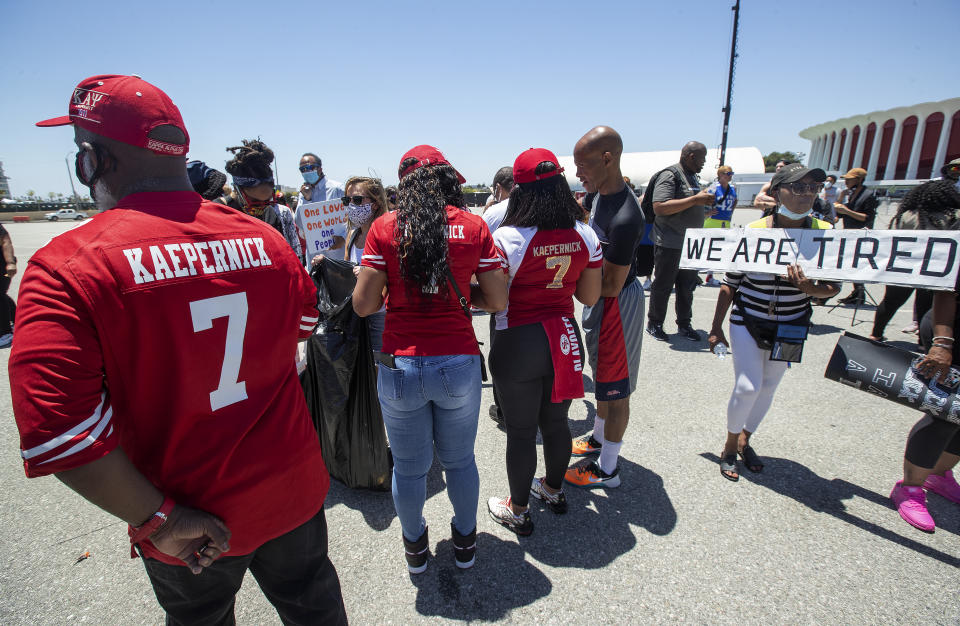NFL's first Black team president says NFL handling of Kaepernick situation was 'never going to go great'
Four years ago this week, Colin Kaepernick began his kneeling protest to bring attention to police brutality. The police killings of Michael Brown, Tamir Rice, and Freddie Gray had all happened in the two years prior, but Kaepernick eventually shared that it was ultimately the shooting of Mario Woods, in December 2015, that prompted his protest.
Kaepernick was widely blackballed by NFL teams for his activism. Today, athletes across the major sports are protesting again, after the police killings of George Floyd, Breonna Taylor, and others, and now the shooting of Jacob Blake. But this time, the NFL is going out of its way to say it will support player protests this coming season.
In June, the NFL released a video in which Commissioner Roger Goodell said unequivocally, “We, the NFL, admit we were wrong for not listening to NFL players earlier, and encourage all to speak out and peacefully protest. We, the NFL, believe Black Lives Matter.” And in a new interview with former NFL player Emmanuel Acho on Acho’s series “Uncomfortable Conversations with a Black Man,” Goodell says, “I wish we had listened earlier” to Kaepernick.
Jason Wright, the newly hired president of the Washington Football Team and the league’s first Black team president, says that in hindsight, it’s no surprise the NFL was not equipped to handle the Kaepernick situation the first time around.
“If you’re steeped in the socio-racial history of this country, or racial inequity in general, the NFL was never going to be a great steward of this deep, intractable, complex conversation,” Wright told Yahoo Finance Live on Wednesday. “And I actually admire all the folks, including Commissioner Goodell, who took it on because it was thrust upon them. It was never going to go great.”

Wright also pointed to a specific sentiment Goodell expressed in his interview with Acho: “Our own thinking, our own knowledge, our own fluency on this topic has evolved over time,” Wright says. “All of us are smarter, we know more about racial inequity, we know more about these topics now. And our feelings have evolved, our views have evolved. For him to openly and vulnerably express that, I think should be taken as a positive.”
Of course, many critics say it’s far too late for the NFL to redeem how it handled Kaepernick, who no longer plays in the league. But another major moment in Goodell’s chat with Acho was about the nature of the protest: “It is not about the flag,” Goodell said. “These are not people who are unpatriotic. They’re not disloyal. They’re not against our military... That misrepresentation of who they were and what they were doing was the thing that really gnawed at me.” (In June, New Orleans Saints quarterback Drew Brees drew backlash from NFL peers and other athletes when he said on Yahoo Finance Live, “I will never agree with anybody disrespecting the flag.”)
It appears certain that when the NFL returns on Sept. 10, a significant number of players will kneel again to continue Kaepernick’s protest; a number have already said they will do it. The NFL has said it will not only allow but encourage that protest, but nonetheless, the league is surely preparing for backlash from some loud voices, including President Donald Trump.
On top of all that, the league is dealing with COVID-19 safety precautions, and teams are deciding whether to allow any fans at their games.
Meanwhile, Wright of the Washington team has his own work cut out for him: reforming a notoriously poisonous team culture.
It is set to be a historic and fascinating NFL season—if the season happens.
—
Daniel Roberts is an editor-at-large at Yahoo Finance and closely covers sports business. Follow him on Twitter at @readDanwrite.
NASCAR's only black driver Bubba Wallace changed the sport forever in 2 days
College football cancellations will cost big universities billions of dollars
IRS guidance on fantasy fees could spell major trouble for DraftKings, FanDuel
Majority of Americans are not ready to go to a sports event, even with masks: poll
Coronavirus could have long-lasting impact on live sports ticket sales
